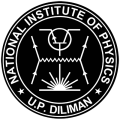Physics Research at NIP
The Institute is the leading center of scientific resarch in physics and applied physics in the Philippines. The NIP research groups are autonomous clusters within the institute that help realize our objective to become one of the best school of physics in this region of the Pacific. Utilizing a comprehensive training via an apprenticeship scheme, thesis work (required for undergraduate and graduate degree) is carried out under the supervision of professors and staff. Each laboratory is managed by a program coordinator who is chosen by the NIP Executive Council after the recommendation of the NIP Director.
NIP Research Agenda
Condensed Matter Physics
Program Coordinator: Arnel A. Salvador, Ph.D.
The Condensed Matter Physics Laboratory is equipped with growth facilities for either liquid phase epitaxy or molecular beam epitaxy as well as various setups for structural (X-ray diffraction, scanning electron microscope), optical (photoluminescence, electrical (current-voltage, hall, resistivity, deep level transient spectroscopy) and magnetic (AC susceptibility) characterization.
Research Areas : growth, physical properties and applications of high temperature superconductors; epitaxial growth, electronic and optical properties of III-V semiconductors in bulk, quantum wells and dots; and opto-electronic devices.
Instrumentation Physics
Program Coordinator: Caesar A. Saloma, Ph.D.
The Instrumentation Physics Group leads in multidisciplinary research involving optics and computational physics. Current work includes development of advanced optical techniques for bio-medicine and materials science, photonic fabrication and manipulation of microstructures, modeling crowd dynamics and financial networks, person-recognition through gait analysis and remote monitoring and control of scientific devices using mobile phones.
Research Areas: laser microscopy; optical trapping and fabrication; complex systems; noise-aided image and signal analysis; wireless and GSM-based technology; and image and video analysis.
Photonics Research
Program Coordinator: Nathaniel P. Hermosa II, Ph.D.
The Photonics Research Group was established by the NIP to serve as the Philippine national center for research, development and advanced manpower training in the area of lasers and laser applications. It was tasked to spearhead the development of high-impact laser physics research capabilities in the country.
Research Areas: Laser systems development: pulsed laser deposition, diagnostics and spectroscopy of laser produced plasma; multi-color and multi-photon interactions; Coherent metrology for nondestructive testing of technical and biological samples: digital shearography and holography, speckle phase retrieval, 3D object recognition and phase microscopy.
Structure and Dynamics
Program Coordinator: Francis Norman C. Paraan, Ph.D.
The research thrust of the Structure and Dynamics Group (SanD) is to understand through theoretical and computational methods the physics principles of microscopic and macroscopic systems as dictated by each system’s underlying structure and the processes with which it undergoes. In the area of condensed matter physics, SanD researchers investigate (i) the effect of quantum confinement in the presence of applied fields such as those in heterostructures, (ii) the phenomena in the quantum Hall regime, and (iii) systems with spin interactions. In the area of computational physics, SanD members study (i) percolation in different geometries, (ii) the dynamics of molecular formation, (iii) modeling of population growth that conform to the mutation-accumulation theory of aging, and (iv) the development of efficient search models through quantum computing.
Theoretical Physics Group
Program Coordinator: Jayson Cosme, Ph.D.
The NIP Fields and Particles Group conducts research on quantum field and gauge theories; quantum field theoretical methods in high-Tc superconductivity; perturbation formalism; general relativity and applications in astrophysics; special methods in non-equilibrium statistical physics and applications to non-linear phenomena in hydrodynamics and plasma physics. The Group’s research interest also includes high energy particle phenomenology and foundations of non-relativistic quantum mechanics.
